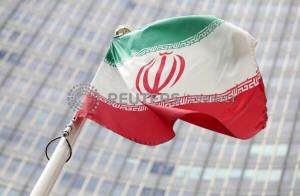Iran says it arrests CIA spies, Gulf tensions simmer
 Send a link to a friend
Send a link to a friend
 [July 22, 2019]
By Michael Georgy [July 22, 2019]
By Michael Georgy
DUBAI (Reuters) - Iran announced on Monday
it had captured 17 spies working for the U.S. Central Intelligence
Agency (CIA) and sentenced some of them to death, deepening a crisis
between the Islamic Republic and the West.
Iranian state television published images that it said showed the CIA
officers who had been in touch with the suspected spies.
In a statement read on state television, the Ministry of Intelligence
said 17 spies had been arrested in the 12 months to March 2019. Some
have been sentenced to death, according to another report.
Such announcements are not unusual in Iran, and are often made for
domestic consumption. But the timing suggests Tehran could harden its
position in a standoff with Western powers which has raised fears of a
direct military confrontation.
In recent weeks the United States has blamed Iran for attacks on
shipping near the Strait of Hormuz, the global oil trade's most
important waterway, accusations Iran has denied.

The United States and Iran have downed drones operated by the other side
and on Friday, Iran captured a British-registered tanker, the Stena
Impero, in the Strait of Hormuz. Tehran had previously warned it would
respond to Britain's seizure of an Iranian tanker off Gibraltar on July
4.
There was no immediate comment on the Iranian allegations by the CIA or
U.S. officials.
Iran announced in June that it had broken up an alleged CIA spy ring but
it was unclear whether Monday's announcement was linked to the same
case.
BRITAIN'S NEXT MOVE
Prime Minister Theresa May's office has said she would chair a meeting
of Britain's COBR emergency response committee early on Monday to
discuss the tanker crisis and the government was expected to announce
its next steps in parliament.
As Britain weighed its next move a recording emerged showing the Iranian
military defied a British warship when it boarded and seized the Stena
Impero, underscoring the challenges Britain faces responding.
Experts on the region say there are few obvious steps London can take at
a time when the United States has already imposed the maximum possible
economic sanctions, banning all Iranian oil exports worldwide.
[to top of second column]
|

The Iranian flag flutters in front the International Atomic Energy
Agency (IAEA) headquarters in Vienna, Austria July 10, 2019.
REUTERS/Lisi Niesner

Washington imposed the sanctions after President Donald Trump pulled
out of a deal signed by his predecessor Barack Obama, which had
provided Iran access to world trade in return for curbs on its
nuclear program.
European countries including Britain have been caught in the middle.
They disagreed with the U.S. decision to quit the nuclear deal but
have so far failed to offer Iran another way to receive the deal's
promised economic benefits.
In Tokyo, Prime Minister Shinzo Abe said on Monday that Japan wants
to make every effort to reduce tension between the United States and
Iran before responding to an expected U.S. request to send its navy
to safeguard strategic waters off Iran.
Japanese media have said Washington's proposal to boost surveillance
of vital Middle East oil shipping lanes off Iran and Yemen could be
on the agenda during a visit to Tokyo this week by U.S. national
security adviser John Bolton.
"We have a long tradition of friendship with Iran and I've met with
its president any number of times, as well as other leaders," Abe
told a news conference after his coalition's victory in a Sunday
election for parliament's upper house.
"Before we make any decisions on what to do, Japan would like to
make every effort to reduce tensions between Iran and the United
States."
The United States is struggling to win its allies’ support for an
initiative to heighten surveillance of vital Middle East oil
shipping lanes because of fears it will increase tension with Iran,
six sources familiar with the matter said.
(Reporting by Gulf bureau and Elaine Lies and Linda Sieg in Tokyo;
Editing by Raissa Kasolowsky and Jon Boyle)
[© 2019 Thomson Reuters. All rights
reserved.]
Copyright 2019 Reuters. All rights reserved. This material may not be published,
broadcast, rewritten or redistributed.
Thompson Reuters is solely responsible for this content.
 |